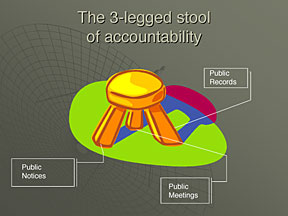Don’t hide your online notices!
Public Notice Resource Center & NNA
Jun 1, 2023

Most newspapers now publish notices on their website in addition to print, even in states that don’t require it. As we’ve written before (https://bit.ly/3MAcugc), it’s one of the most important things publishers can do to help their state’s press association protect newspaper notice.
However, too many publishers still make it difficult for users to find the notices that are posted on their website. At the end of April, we spotted a perfect illustration of the phenomenon.
The Westerly Sun published an editorial (“In defense of legal notices”) (https://bit.ly/436pr6P) arguing against legislation that has been introduced in Rhode Island’s General Assembly that would allow local governments to publish notices on their websites in lieu of print newspapers. A website visitor quickly added a helpful suggestion in the comments section below the article.
“If the Sun believes in the importance of legal notices, how about adding a ‘legal notices’ link on your website?” asked RIMom. “If you show the state you are putting them online, wouldn’t that strengthen your argument?”
Why yes, RIMom, it would!
It turns out the Sun does post their notices on the site. As a staff member helpfully pointed out to RIMom in a subsequent comment, they’re hidden behind the “Public Notices” link, which can be found in the website’s “Classifieds” pull-down menu.
The Sun fell into the same trap that ensnares most newspapers when they post notices on their website — wrongly assuming their readers understand newspaper industry jargon. Most people don’t know that in Newspaper World, public notices are considered “classifieds,” so they wouldn’t think to look for them there. That’s why your “public notices” (the term we prefer — https://bit.ly/3OqX4My) or “legal notices” require their own link in the primary navigation toolbar on your website.
Whatever you do, please don’t call them Legals! Nobody except you and some of your employees know what that means.
SEVERAL ELIGIBILITY, SELF-STORAGE BILLS ADVANCE
It’s the time of year when many states have either ended their legislative sessions or are preparing to adjourn sine die in the next month or so. We’ve also passed the point in most states when new bills can be introduced or existing legislation that hasn’t passed out of the body in which it was introduced can be considered in the opposite chamber.
Nevertheless, several noteworthy public–notice–related bills we’ve been following did see some movement in April.
Most importantly, bills in Arizona and Iowa authorizing local governments to publish notices on government websites instead of newspapers were significantly amended before they passed their original chambers.
Arizona SB-2006 was approved in the Senate on a party-line 16-13 vote after an amendment limited its application to Maricopa County. (Some elements of the state GOP are at war with Arizona’s largest county: https://bit.ly/42Z33MK. For example, Republican State Senator Wendy Rogers, who voted in favor of SB-2006, was recently granted a restraining order (https://bit.ly/3ohNlxv) against a Maricopa-based Arizona Capitol Times journalist for investigating her residency.
The bill has now passed through two committees in the House, but after Republican member Liz Harris was expelled (https://bit.ly/3pOJskc) and the GOP majority in the lower chamber was reduced to a single vote, some observers question whether it will ever reach the House floor. And even if it does pass the House, there’s a good chance Arizona Governor Katie Hobbs, a Democrat, will veto it (https://bit.ly/3Ojxauu).
The bill in Iowa began as a complicated scheme that would have eliminated newspaper notice, but it was approved last month on a 37-12 Senate vote only after it was amended to maintain that statutory requirement. The amended version of SF-546 requires notices to be published on newspaper websites or, for papers without a website, on the Iowa Newspaper Association’s statewide site. Newspapers must post the website notice within 48 hours of receiving it from a government entity, and that online publication commences the statutory-requirement period, regardless of when the notice is published in print.
The amended SF-546 now only allows the posting of a notice on a government website to satisfy statutory notice requirements when “no official newspaper exists” in a particular jurisdiction. It was referred last week to a House committee. Iowa’s General Assembly is still in session this week, even though it was originally scheduled to adjourn on April 28.
Two important bills liberalizing the standards under which newspapers qualify to publish notices also advanced last month in Missouri and Oregon, both with the support of their state’s press association. Missouri HB-752 reduces the “consecutively published” standard for official newspapers from three years to one. It also increases the period during which a successor newspaper must begin publishing to qualify as an official newspaper, from 30 days to 90 days after the previous paper closes. Similar bills supported by the Missouri Press Association failed to make headway in prior sessions. This year’s version of the bill passed the House 132-5 on April 17, but a hearing scheduled last week in the Senate was canceled.
Oregon HB-3167 expands the type of newspaper formats qualified to meet statutory notice requirements to include e-editions. If it passes, Oregon will become the second state to approve such an expansion; North Dakota passed a similar measure earlier this year (https://bit.ly/3pMOZaU). HB-3167 also allows free-circulation papers to publish notice for a period “not to exceed twelve months” in jurisdictions where the only paid-circulation paper has ceased publication. It also adds new content standards to the public notice law, requiring “consistent, regular coverage of local news” and at least 25 percent of “total news content” to be “locally and originally” produced. It passed the House early last month on a 58-1 vote and is scheduled to be heard in a Senate committee later this week.
Missouri and Oregon both also saw self-storage bills advance last month. Missouri HB-1120 allows self-storage operators to advertise lien sales “in any other commercially reasonable manner” as an alternative to newspaper notice. Oregon SB-862 authorizes the owners to advertise lien sales on websites that provide a platform for auctions or sales of personal property. It also reduces from two to one the number of weekly publications required if the owner still chooses to advertise in a newspaper. The Missouri bill passed the House early last month by a 135-20 margin; the Oregon version passed the Senate a week later, 20-9.
Self-storage bills also crossed chambers in California and Texas. The Texas bill combines all of the elements of the Missouri and Oregon measures; it passed the House last month by a vote of 99-46. California’s self-storage bill was amended to maintain the statutory requirement of newspaper notice, although it allows self-storage operators to reduce the number of weekly newspaper ads they’re required to publish from two to one as long as they also advertise the lien sale on a website that conducts auctions or sales. It recently passed the Senate unanimously.
The Texas Press Association-backed SB-943 also advanced last week after unanimously passing the Senate. It requires newspapers to post their notices free of charge on their website, if they have one, and on TPA’s statewide public notice site.
In Florida, an elections bill that potentially eliminates a slew of newspaper notices is on its way to the Governor’s desk after passing both houses last week. Florida S-7050 allows local governments to post all or most election notices on their county website or the website of the supervisor of elections, in lieu of newspaper publication.










